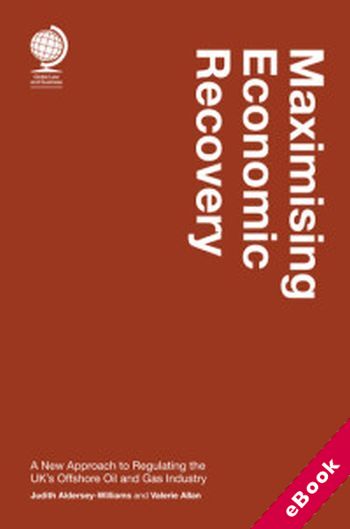
The device(s) you use to access the eBook content must be authorized with an Adobe ID before you download the product otherwise it will fail to register correctly.
For further information see https://www.wildy.com/ebook-formats
Once the order is confirmed an automated e-mail will be sent to you to allow you to download the eBook.
All eBooks are supplied firm sale and cannot be returned. If you believe there is a fault with your eBook then contact us on ebooks@wildy.com and we will help in resolving the issue. This does not affect your statutory rights.
The regulatory regime encapsulated in the term ‘maximising economic recovery’ or MER, now administered by the North Sea Transition Authority (NSTA), was introduced in 2015. It emerged from a government-commissioned report by Sir Ian Wood, published in 2014, which recommended the introduction of a new tripartite strategy for MER from the UKCS involving HM Treasury, industry and a new regulator at arm’s length from government.
This was intended to address the problems of an ageing basin in which smaller discoveries meant new fields were more marginal and interdependent than in the past. An increasingly diverse set of companies operating these smaller, more interconnected fields resulted in greater competition for ageing infrastructure and required increased collaboration between operators to ensure that fields remain economical. These factors, coupled with growing competition for investment from outside the UK, had led to significant falls in production, production efficiency and exploration.
The new approach requires regulated persons active in UKCS operations to seek to maximise economic recovery not just from their own assets but across the basin and therefore requires unprecedented levels of collaboration. It has also resulted in a far more hands-on regulator seeking to use both influence and enforcement to radically alter the culture of the UKCS.
This book is not a complete guide to oil and gas industry regulation in the UK; instead, it is specific to the MER UK regime. It describes the legislative changes that introduced the regime, the nature of the NSTA, and how it uses ‘soft power’ to achieve many of its aims. It also describes the regulatory tools at the NSTA’s disposal including the nature of the OGA Strategy and how this can be enforced through sanctions, the right to attend a wide range of industry meetings, request vast amounts of industry data and to get involved in industry disputes. It also discusses the increasing focus of the NSTA on the energy transition.
This book will be of interest to legal practitioners active in energy law whether in private practice or in house, academics and students with an interest in energy regulation and regulators looking at the UKCS as a model for other jurisdictions.